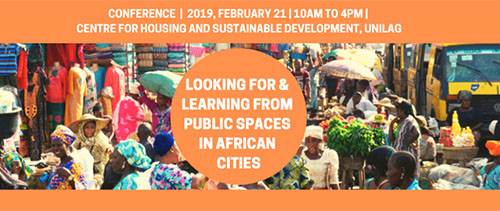One Day Conference: Looking For and Learning From African Public Spaces

Date: February 21, 2019, 10am – 4pm
Location: Resource Hall, Centre for Housing and Sustainable Development, University of Lagos (UniLag)
Registration: The conference is free and open to all. Participants must register on Even Bright.
Objectives
The notion of “public spaces” is now largely widespread. It has become pervasive in academic literature, public policies and media discourses, to the point that it nowadays appears as a universal, or even consensual, notion. Yet, not only has the very idea of public spaces emerged relatively recently, but it is also tied to both a spatial and temporal context. Appearing in its manifold form in the second half of the XXth century in the United States and Europe, this notion – referring to a mythicized vision of the Greek agora construed as a space of encounter with Otherness and free public debate (Mitchel, 2003) – paradoxically rose to prominence as a critique of the disappearance of the object it described: indeed, the notion of public spaces was born out of the observation of the vanishing of such spaces in large North American (Jacobs, 1977; Sorkin, 1992), and more broadly Western cities (Ghorra-Gobin, 2001), as a result of growing car usage, urban sprawl, shopping mall development, etc. Akin to notions of a similar type with a universal ambition (heritage, development, sustainability, etc.), public spaces therefore correspond – at least within this framework – to a contextual notion, not to say a Western one. Yet, such spaces are often apprehended in accordance with this Western conception, regardless of where they are located. In the case of African cities, public spaces are usually identified and assessed – most often pejoratively – in line with this conception. Within this framework, these spaces in the African urban context are contemplated in the light of their weaknesses and failures in view of the Western model of public spaces.
Drawing on a postcolonial approach to cities (Robinson, 2006), this one day conference follows an opposite path. It will not aim at determining how public spaces in African cities match (or not) a largely fantasised vision of Western public spaces. Instead, it will build on contemporary realities in African cities to ask what these public spaces in specific contexts are, can be or will possibly be in a foreseeable future. Considering various major African cities (Lagos, Ibadan, Johannesburg, Cape Town, Kinshasa, etc.), we will attempt to capture ways in which such spaces are lived, represented, remembered and imagined by the populations who inhabit them and use them, as well as by public and private actors (municipal authorities, real estate developers, associations, artist collectives, etc.) who manage and conceive them. For so doing, three thematic roundtables will be organised (see provisional planning below) gathering Western and African academics of various disciplinary backgrounds (geographers, anthropologists, political scientists, historians, urban planners, etc.), urban actors, association members and artists, who will exchange their views on public spaces in contemporary African cities. With these encounters, we aspire to contribute to emerging new visions of public spaces in African cities, enabling us to understand better these spaces from and for what they are, or even inviting more broadly to rethink the notion of public spaces from these cities.
Planning
The one-day conference “Looking For and Learning From African Public Spaces” will include three roundtables, followed by Q&A with the audience
- First roundtable “Urbanity and public spaces”, 10.30am-12am
This first roundtable will approach public spaces as spaces where urbanity, that is the relation between the city and its urban-dwellers, is invented. We will question the place occupied by African city public spaces in the making of the feelings of belonging to the city.
Participants: Pr. Philippe Gervais-Lambony (geographer, University Paris Nanterre, France), Dieudo Hamadi (movie maker, Lumumbashi, DRCongo), Dr. Taibat Lawanson (urbanist, UniLag, Nigéria)
- Break: 12am-12.30am
- Second roundtable “Arts and public spaces”, 12.30am-2pm
This second roundtable will focus on the part of arts and artists in representing or even inventing publicness in African urban contexts. It will aim at asking how art can contribute to the making of contemporary African public spaces.
Potential participants: Pr. Filip de Boeck (anthropologist, Leuven University, Belgium), Dr. Pauline Guinard (geographer, ENS Paris, France), Polly Alakija (plastic artist and chairwoman of the Lagos Arts Council)
- Third roundtable “Afro public spaces-times”, 2pm-3.30pm
This ultimate roundtable will question the notion of “African public spaces-times”. It will investigate whether public spaces present, notably due to their history but also through practices they currently host, common features that will make them part of a same whole. As a conclusion of this symposium, the roundtable will enable us to assess how specificities of urban public spaces in Africa can fuel inspirations, or even future models, in other urban contexts.
Potential participants: Qudus Onikeku (choreographer/Founder and Artistic Director QDanceCenter Lagos), Onye Ozuzu (choregrapher, dean of the school of the Arts, University of Florida - Gainesville, USA), Papa Omotayo (architect, Whitespace Creative Agency, Lagos), Dr. Saheed Aderinto (historian, Western Carolina University, USA)
Convenors
Pauline Guinard (ENS Paris, France), Emilie Guitard (IFRA Nigeria, Nigeria), Clémentine Chazal (IFRA Nigeria, Nigeria), Ismael Maazaz (Edinburg University, UK) and Chrystel Oloukoi (Harvard University, USA)


Social Media
Mailing List